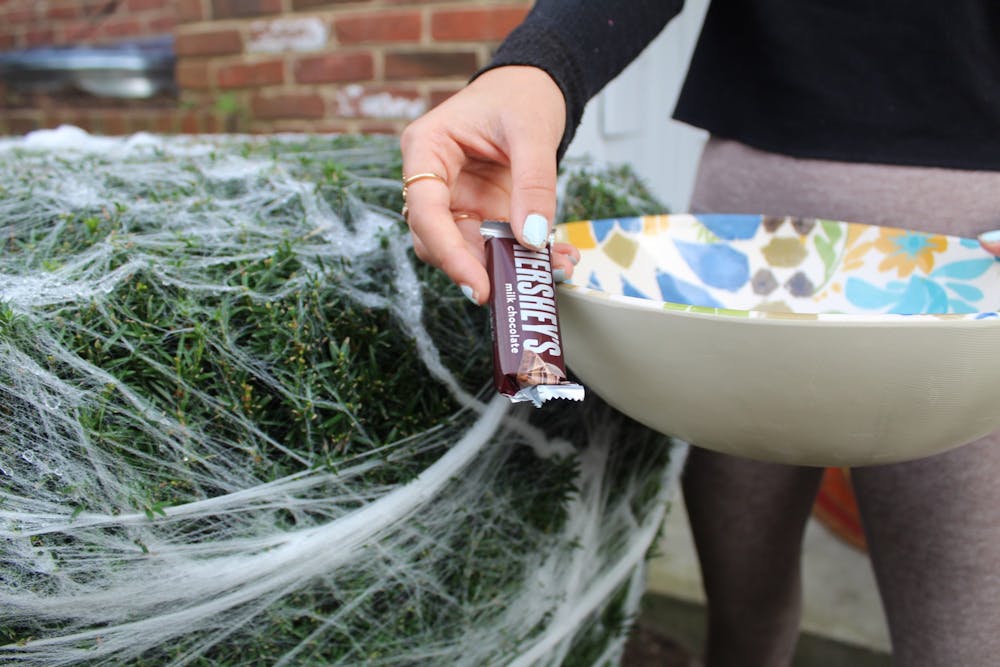In past years, the scariest parts of Halloween were haunted houses and spooky costumes. Halloween in 2020 brings a whole new fear for parents and children — trick-or-treating amid the coronavirus pandemic.
American University students and faculty in residential neighborhoods are faced with the dilemma of how to safely trick-or-treat during the global pandemic. Even if one does not actively participate in handing out or receiving candy, there is still a possible risk of contact from trick-or-treaters who ring your doorbell.
The D.C. Department of Health strongly discourages traditional door-to-door trick-or-treating in their official guidelines released on Oct. 5 for Halloween and Día de los Muertos. The guide suggests low- and medium-risk alternatives, such as neighborhood drive-through events, one-way trick-or-treating with individually packaged candy lined up at the edge of a yard and online costume parties.
Senior Serena Thapa plans to greet trick-or-treaters at the doorstep of her Spring Valley home. Thapa decided to hand out candy to a small group of children on her street after speaking with her neighbors, agreeing to follow suggested COVID-19 protocols, while providing the kids in the neighborhood with a memorable experience.
Thapa and her roommates will be getting tested for COVID-19 before they welcome trick-or-treaters to their front door. According to Thapa, they will only have one person answering the door and distributing the candy, cleaning the bowl and the outside of the candy wrappers in between trick-or-treaters. They will not touch the childrens’ bags and will be wearing masks the entire time.
“As a kid, trick-or-treating was such a special experience for me, and I wouldn’t want that to be taken away from any kid, especially because we have been dealing and working through the pandemic for about eight months now,” Thapa said.
Some people are comfortable with lower-risk trick-or-treating activities, while others are not comfortable with going out at all.
Senior professional lecturer of chemistry at AU, Michele Lansigan, will not take her two sons, ages 2 and 6, trick-or-treating this year. While her sons have been looking forward to dressing up and collecting candy around the neighborhood, Lansigan decided to refrain from trick-or-treating to protect the health and safety of both her family and neighbors.
Despite the change, Lansigan said she still wants to celebrate Halloween in other ways.
“What we plan to do is have our kids dress up, maybe get a pumpkin to carve, and then outside of our doorstep we will still leave candy for people who still come,” Lansigan said. “But we will no longer open the door, we will just have them take candy from outside, not only for our safety, but for theirs.”
Virtual events are another alternative for safely celebrating Halloween during the pandemic. The embassies will host a virtual trick-or-treating event on Oct. 31 from 6:30 p.m. to 8:30 p.m.
Trick-or-treating at the embassies is a long-standing tradition in the AU community. Students and faculty experience a night of trick-or-treating “around the world,” stopping at each embassy to collect candy.
The alternative virtual trick-or-treating experience includes an interactive tour of Embassy Row that will explore the “mysteries and origins” of the embassies. Tickets cost $20. Attendees have the option to purchase an additional $10 bag of candy from around the world with their tickets, and they can pick up their bags at pop-up locations on the morning of Halloween. Throughout the tour, participants will learn about the origins of different embassy buildings.
Junior Lindsay Schawelson went trick-or-treating at the embassies during her freshman year, where she toured the Haitian Embassy and met an ambassador.
Although Schawelson won’t attend the virtual event, she said it's a good alternative to normal festivities for kids in D.C., since it’s safer and allows trick-or-treaters to try treats from different countries.
While a traditional Halloween night full of trick-or-treating and haunted houses may not be realistic during the pandemic, low- and medium-risk alternatives can help ensure that DMV residents celebrate safely.





